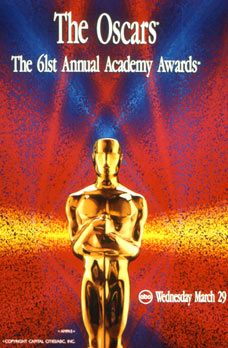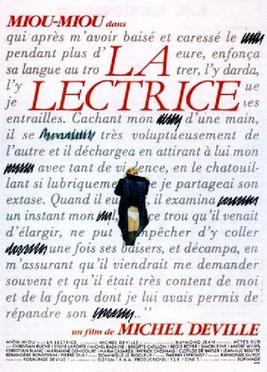
The Academy Award for Best Animated Feature is given each year for the best animated film. An animated feature is defined by the academy as a film with a running time of more than 40 minutes in which characters' performances are created using a frame-by-frame technique, a significant number of the major characters are animated, and animation figures in no less than 75 percent of the running time. The Academy Award for Best Animated Feature was first awarded in 2002 for films released in 2001.
The Academy Award for Best Documentary Feature Film is an award for documentary films. In 1941, the first awards for feature-length documentaries were bestowed as Special Awards to Kukan and Target for Tonight. They have since been bestowed competitively each year, with the exception of 1946. Copies of every winning film are held by the Academy Film Archive.

Martha Plimpton is an American actress, activist, and former model. Her feature-film debut was in Rollover (1981); she subsequently rose to prominence in the Richard Donner film The Goonies (1985). She has also appeared in The Mosquito Coast (1986), Shy People (1987), Running on Empty (1988), Parenthood (1989), Samantha (1992), Small Town Murder Songs (2011), Frozen II (2019), and Mass (2021).

River Jude Phoenix was an American actor and musician. Phoenix was known as a teen actor before taking on leading roles in critically acclaimed films. He received numerous accolades including Volpi Cup and the Independent Spirit Award as well as nominations for an Academy Award, and Golden Globe Award.

Christine Ann Lahti is an American actress and filmmaker. She was nominated for the Academy Award for Best Supporting Actress for the 1984 film Swing Shift. Her other film roles include ...And Justice for All (1979), Housekeeping (1987), Running on Empty (1988), Leaving Normal (1992), and A Beautiful Day in the Neighborhood (2019). For her directorial debut with the 1995 short film Lieberman in Love, she won the Academy Award for Best Live Action Short Film.

The 61st Academy Awards ceremony, organized by the Academy of Motion Picture Arts and Sciences (AMPAS), honored the best films of 1988 and took place on Wednesday, March 29, 1989, at the Shrine Auditorium in Los Angeles, beginning at 6:00 p.m. PST / 9:00 p.m. EST. During the ceremony, AMPAS presented Academy Awards in 23 categories. The ceremony, televised in the United States by ABC, was produced by Allan Carr and directed by Jeff Margolis. Ten days earlier, in a ceremony held at the Beverly Hills Hotel in Beverly Hills, California, the Academy Awards for Technical Achievement were presented by host Angie Dickinson.
The 60th National Board of Review Awards were announced on December 13, 1988, and given on February 27, 1989.
The Revolving Doors is a 1988 Canadian-French French-language drama film directed by Francis Mankiewicz. The film was selected as the Canadian entry for the Best Foreign Language Film at the 61st Academy Awards, but was not accepted as a nominee.

The Reader is a 1988 French film directed by Michel Deville. The film won that year's Louis Delluc Prize, and was nominated for nine César Awards including Best Supporting Actor, won by Patrick Chesnais.

The Academy Award for Best Supporting Actor is an award presented annually by the Academy of Motion Picture Arts and Sciences (AMPAS). It has been awarded since the 9th Academy Awards to an actor who has delivered an outstanding performance in a supporting role in a film released that year. The award is traditionally presented by the previous year's Best Supporting Actress winner. In lieu of the traditional Oscar statuette, supporting acting recipients were given plaques up until the 16th Academy Awards, when statuettes were awarded to each category instead.
The Academy Award for Best Original Song is one of the awards given annually to people working in the motion picture industry by the Academy of Motion Picture Arts and Sciences (AMPAS). It is presented to the songwriters who have composed the best original song written specifically for a film. The performers of a song are not credited with the Academy Award unless they contributed either to music, lyrics, or both in their own right. The songs that are nominated for this award are typically performed during the ceremony and before this award is presented.

Up (Original Motion Picture Soundtrack) is the film score to the 2009 Disney-Pixar film of the same name composed by Michael Giacchino. This is his third feature film for Pixar after The Incredibles and Ratatouille. Giacchino wrote a character theme-based score that the filmmakers felt enhanced the story of the film. Up received positive reviews from music critics and won major awards. Despite being well regarded, Up was not released as a compact disc (CD) until 2011, when it became available via Intrada Records.
Charles L. Campbell was an American sound engineer who won three Academy Awards for Best Sound Editing. He also served as Governor of the Academy of Motion Picture Arts and Sciences (AMPAS) 1984-1987.

The Academy Award for Best Original Screenplay is the Academy Award for the best screenplay not based upon previously published material. It was created in 1940 as a separate writing award from the Academy Award for Best Story. Beginning with the Oscars for 1957, the two categories were combined to honor only the screenplay.
The Story of Fausta is a 1988 Brazilian drama film directed by Bruno Barreto. The film was selected as the Brazilian entry for the Best Foreign Language Film at the 61st Academy Awards, but was not accepted as a nominee.










